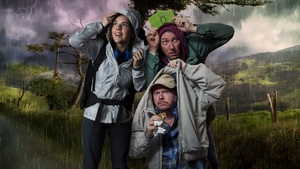Anthropolis I: Prolog/Dionysos
In the organizer's words:
Prologue
The story of the city of Thebes begins with a double murder. After Kadmos has searched in vain for his sister Europa, abducted by Zeus, on the continent, he turns to the Oracle of Delphi. "Forget the sister," is the answer, "drive a cow before you, and where she settles, found a city." Kadmos rushes the cow before him until it collapses dead near a spring, which in turn is guarded by a dragon. Kadmos slays the dragon, breaks out its teeth and sows them into the earth. Immediately, armed dragon men grow out of the teeth, warriors who slaughter each other - only five survive the massacre. With them, Kadmos founds the city of Kadmeia, later called the seven-gated Thebes. From the beginning, violence is inscribed in the history of civilization. Already the first civilizing measures for the foundation of this primeval city of the western world show up as killing. The destruction of the animal and the animal being is quasi the precondition to be able to exist at all as a society in the urban space. But how can the acts of violence be stopped, which shake the foundations of the human city from generation to generation anew?
Dionysus
The story of the birth of Dionysus from the thigh of Zeus sounds more than bizarre. No wonder that nobody wants to believe it in Thebes, after Dionysus' earthly mother Semele, a daughter of Kadmos, had to burn so shamefully. Supposedly, the father Zeus took the fetus out of the fire and carried it in his leg. Meanwhile, Thebes has grown into a rich city, and Kadmos has ceded the throne to his grandson Pentheus. Then Dionysus appears and claims that he is entitled to religious cult status. However, Pentheus, who has been trained to observe rules and regulations, refuses to believe him. Dionysus then plunges the patriarch's system of order into a deep political and moral crisis. He sends the women on a trip and spreads madness and frenzy among them. The intoxication ends cruelly and bloodily. Dionysus triumphs over the infidels of the city. He seems to have uncovered a collective desire for violent downfall that is inherent in the construct "city" in its repressed positions.
With the "Bacchae" Euripides wrote his last and most radical tragedy. The transfer and adaptation of the "Bacchae" under the new title "Dionysus" intensifies the conflicts between fantasies of doom and reason, mania for order and pleasure in chaos into today's questions of an urban society. How much tension are we still willing to endure?
Find here information about the culinary offer around the ANTHROPOLIS marathon.
This content has been machine translated.












